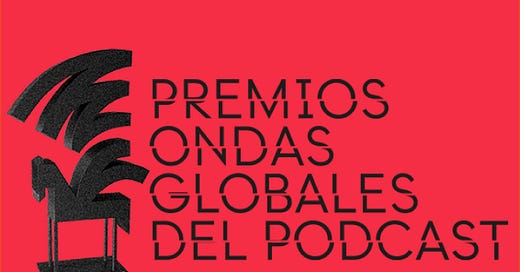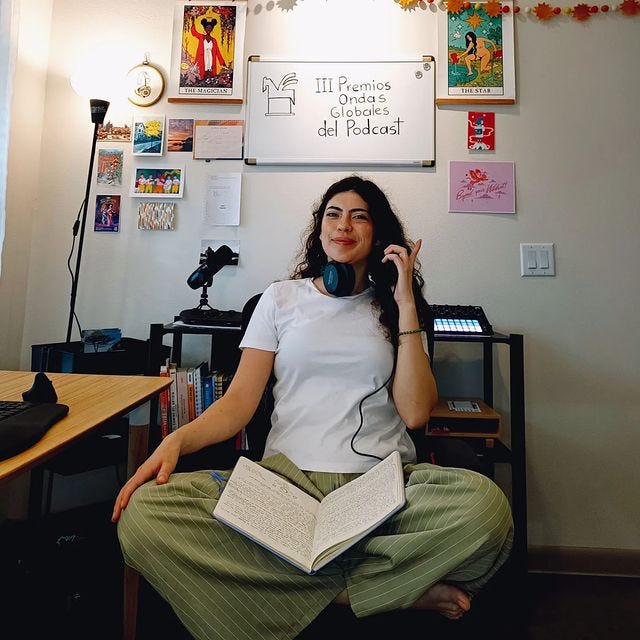6 takeaways after voting Los Premios Ondas Globales del Pódcast 2024
Notes and thoughts about the winners of the most prestigious podcast awards in Spanish.
¡Hola!
It is a pleasure to have you in Escribir a Voz Alta. This greeting goes especially to those who have subscribed in the last month. Welcome to my writing dojo. Here I share reviews, audio industry opinions, and short stories. This edition will be brief but very substantial. I'll start with a good cause and then my analysis of the 2024 Premios Ondas Globales del Podcast winners.
Before I start: a brief update on my solo project: I've already completed three scripts and I'm collaborating with colleagues to put original music and beautiful illustrations on it. It's almost far enough along to tell you more details. It's been days of a lot of solitude writing. If you want to know more about the day-to-day follow me on Instagram
First, a good cause
It’s the last week to donate and support a talented colleague to recover his audio studios. A month ago a group of criminals broke into Daniel Murcia's studio in Bogota, Colombia, taking all his audio equipment. Daniel is one of the best professionals I know, together we have worked on international award winning equipment such as“Uribe Acorralado”, “Duolingo Relatos en inglés” and many more. If you contribute you’ll be supporting a much needed reconstruction of Daniel's studio so he can work on many more audio stories. The worst part of a theft is not just loosing stuff, but feeling alone in repairing the damage. Here is Daniel telling his story..
Donate at Vaki or via Paypal.
My analysis of los Premios Ondas Globales del Pódcast 2024
Some of you all know it already, I had the honor of being a member of the jury for the Premios Ondas Globales del Pódcast 2024, the most prestigious audio awards in the Spanish-speaking world. It was a great honor and opportunity. This was the year with more countries and nominations, running this marathon of listening to 204 podcast series in three months was an exercise in taking the pulse of global audio production in Spanish, for which I am very grateful. Today I want to share with you 6 conclusions I reached after the publication of the list of winners.
I am not going to refer to the complete list of the 18 winners, but to the lessons and podcasts that marked me after having finished the process. Take it as a provocation, so that we can continue the conversation about it.
Spain is the strongest podcast industry in Spanish language.
The biggest winner of Los Ondas is the industry in Spain. This may seem obvious to someone over there. But on this side of the world, where so many shows were canceled, we experienced massive layoffs and a drastic reduction of investment, it feels very much that production in Latin American countries is at its most lacking. In our countries, we experience scarcity in thinking about funding a show, a festival, or something that can become massively popular. My greatest learning as a jury was to discover the world of production and consumption of podcasts in Spain: they have their stars, their summer hits, their distribution circuits, and their fanbases. For example: The trajectory award for "Todopoderosos" a pop culture podcast that has been producing for 10 years and sells out its live shows. Spain has achieved what all podcasters in Latam have wanted: that audio is respected culturally in the same way as other media. This, it must be said, thanks to more diverse sources of public and private investment.
I almost didn't vote "La Carcel no da risa" as the narrative podcast of the year.
This podcast generated a conflict for me from the first listen. It's about a comedian, Jose R Guzman, who is incarcerated in Texas for carrying marijuana. The script is great, the production and Guzman's narration is spectacular. The story grabs you and makes you care about everything that happens to the protagonist in that jail. However, my inner purist told me "How am I going to choose the best narrative for a podcast 'based on real events'? The line for me is very clear: narrative nonfiction journalism is fact-checked and accurate. Guzman alters things for the sake of comedy, that was what generated the conflict for me. It was something I mulled over extensively thanks to the other members of the jury. I opened myself to the possibility of considering it as a narrative piece rather than a journalistic one, which led me to a different conclusion. I think the point of this podcast is to re-signify a traumatic event through comedy. The stories of Latinos in the U.S. are often stories of trauma. I have heard ad nauseam that trauma in tears and "emotional tape" on podcasts like "This American Life" or "Code Switch" among many others. What bothers me most about it is that these stories are told often from aseptic pity-producing journalism, creating one-dimensional characters, meaning: someone whose only identity is being a victim. " "La Carcel no da risa" gives a story about trauma a much-needed three-dimensionality. When horrible things happen to us we make stories, turn them into jokes, exaggerate them, and even add charm. That's how we heal in Latin America. In all the countries where we have gone through internal conflict, we have decades of resignifying our traumas, this series opens an alternative way to tell them. Congratulations to the team of this show and to Guzmán.
“¿Quién mató a Anna Cook?”’s script, a non-fiction narrative podcast was narrated by two actresses.
In the opposite direction to the previous example, this podcast was investigative to the core. Rodrigo Fluxá started thinking about the story in 2017. It was not until 2019 that Valentina Millán, Sebastián Palma, and Podium Chile gave it the form of a podcast. According to data from Diario La Tercera, together they processed more than a hundred interviews and 500 pages of court files, revealing unpublished material that would contribute to a new judicial investigation with enough material to determine who killed Cook. Rodrigo was an experienced journalist and writer when he first gave the story idea to recent graduate Valentina. It was the intergenerational dynamic between the two that inspired the dynamic between the show's two narrators, Fluxá said that "at its core, it's an exercise that mirrors the real journey of journalists throughout the investigation." In the best style of podcasts such as "Reply All" or "Radiolab " this podcast is narrated as the two host voices converse. With a special quality: the narrators are Trinidad González and Catalina Stuardo, two Chilean actresses. Why would they have chosen two actresses to interpret the real dynamic between two journalists? I'm still thinking about it. A well-deserved award for a masterful script.
“Hundido” winner of Best Production is an award for Argentina.
Revista Anfibia’s will to create podcasts despite censorship and the social and economic crisis the country is going through is a work of giants. This production based on ethnographic research on the sinking of a submarine deserves recognition. At the same time, the award for "Hundido" also accounts for a fabulous year of narrative podcast productions in Argentina that have not received enough international appreciation. Let's think about it for a moment: this series premiered in the same year as "Rodrigo, La leyenda Continúa", "La One" and "Algunos me decían Goebbles". All narrative series as well. The same year in which journalism against Milei was grounds for censorship and the same time in which Spotify Argentina canceled more original series. Audio storytelling in Argentina at this moment is more a matter of enthusiasm than money and for that reason, they have all my respect for the narrative series there because whether or not they win awards, they reaffirm the Argentine style of audio storytelling. This is a laudable effort that deserves international recognition.
If only more conversationalists dared to do narratives.
"10 Mujeres" won Episode of the year. The fact that"Se Regalan Dudas", one of the most listened to conversational podcasts in Spanish, decides to make a narrative series is a perfect circle moment for the podcast as a medium. We think they are two separate paths: make it conversational, make it popular, maybe a video podcast, and from there to live shows. And make a narrative, with all the care in the world, so that its end is the publication itself. But 10 Mujeres invites the two paths to support each other. This is a series produced by Dudas Media where there is no voice of Ashley or Leticia but of women's voices interpreting ten victims of femicide. Why ten? Because that is the number of women murdered in Mexico every day. In each episode each woman's life is narrated in first person, it is chilling and deeply moving to listen to. The podcast is not only an example of how a narrative responds to a community created by a conversationalist, but also a reference to digital content strategy, having resources for help, frequently asked questions, and legal alphabet for possible victims of gender violence. Applause for Alma Delia Murillo who wrote the scripts.
“Meterse al Rancho” makes me think about what would happen to abandoned shows.
I have to refer to the only winner from Colombia in this edition. It has been a very hard year for local production in my country as well. This show was awarded and no longer exists. It was one of the many canceled due to Spotify's change of strategy, even so, Santiago Alarcón's work as host is remarkable. He proves that in conversational podcasts, endurance is worth more. We've seen many journalists, actors, and influencers debut their interview podcasts, but few are truly in the service of the listener and well produced. This show has great conversations because it listens and develops the story of each guest, Alarcón doesn't want to show off what he knows, he wants to ask the questions that any listener would ask. This award also leaves a manifesto: It is awarded even if it is a canceled show because it recognizes the work done. We were not the only ones. This week, "Meterse al Rancho" received the India Catalina Award for best podcast. Its last episode was released in August 2023. I wonder what will happen to the audience of shows like this, who owns the intellectual property of a canceled series, and what good did it do to nurture a community for these podcasts? It is our job as audio professionals to make sure our content is not a bird of passage.
So much for this edition of Escribir en Voz Alta. Thanks to María Jesús Espinosa and Eugenio Viñas for bringing me to the Ondas. I also thank my colleagues on the jury: Luis Alcázar, Ashley Frangie, Jose Gutiérrez and Elena Neira.
If you want to know more about my creative process and the new series I'm creating, subscribe to this newsletter.
Long live the Ondas and the professionals who keep the medium alive.





